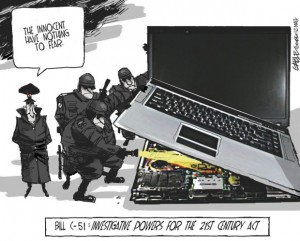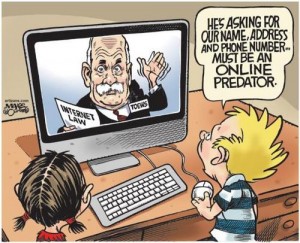I’m a little behind the eight ball, as this is now “old news”, but this week I donated money to Greenpeace Canada for the first time in my life. Why? Well, I’ll explain it this way: When you donate to Greenpeace online they have a field on the donation form that asks why you’re motivated to donate to them. This is what I filled in: “Stephen Harper says you’re terrorists” (archived) (not to mention funded by foreign money [archived]).
Way to go Stevie. Nothing like using hyperbole to convince people to support those not on your side of what should be a reasoned debate. Maybe you should take a lesson from … uh, yourself (archived).
In other vilify-your-opponent news, there’s your friendly neighbourhood defender against the bogeyman, Vic Toews, Canadian Minister of Public Safety. Didn’t he learn anything from George Bush’s “Either you are with us, or you are with the terrorists” gaffe? (Read or watch George; read or watch Vic.) Really, any thinking person on either side of any argument rejects this kind of useless rhetoric, and some courageous people (like Margaret Wente [archived]) have the guts to come right out and say it.
Mr. Toews also took to the pages of the Asian Pacific Post in a full-page editorial that may have been preaching to a choir that probably thinks Canada is too soft on crime anyway, given the regimes in place where many of the readers of that publication originate. (Incidentally, the online version appears to be a slightly reduced version of the printed one.) He also makes the disingenuous comparison of private data (what he calls “basic subscription data”) to “the modern equivalent of phonebook [sic] information”. Mr. Toews, I can’t help but wonder if your personal home phone number is listed in your local telephone directory. Is it? Oh, it’s unlisted? You mean, you want it to be private?! What a radical concept!
A much more reasoned response to Toews’ rhetoric comes in the form of an editorial by John Ibbitson (‘With us or with the child pornographers’ doesn’t cut it, Mr. Toews [archived]). He writes:
Privacy commissioners in Ottawa and the provinces will not like being called such vile names. … There are powerful arguments on both sides. None of us want to handicap police in their efforts to track those who would defraud us, harm children or plot acts of terror. But we must also be wary of granting the state new powers that could restrict the sovereignty of citizens. … should the state be allowed to have new powers to know who we are on the web — in effect, to register our online identities — without a judicial warrant or even our knowledge or consent?
But Yoni Goldstein also makes half a point in his editorial (or is it a satire piece?) Stop Pretending to Care About Privacy (archived). He contends that the general public is hypocritical and has already given up any notion of privacy in”tweeting” and “facebooking” the minutiae of their lives, and using Gmail. (Actually, I’ll give him two-thirds of a point, as he also validly points out the hypocrisy of people who wail about their privacy being violated, all while keeping rags like the National Enquirer and websites like TMZ in business so that they can see the nipples and dead bodies of celebrities.) However, he conveniently doesn’t mention things like monitoring private communications like email, instant messaging, voice and video.
Sometimes it takes a cartoon to really get the point across, and so I present these two. The first refers to Bill C-51 (the Investigative Powers for the 21st Century (IP21C) Act, also here), a predecessor to the current Bill C-30 (previously known by its short title Lawful Access Act, tendentiously renamed to Investigating and Preventing Criminal Electronic Communications Act to make sure that opponents of the bill are aware that they are supporters of child pornographers), and plays on the well-worn (but completely bogus) argument that if you’re not doing anything wrong, you have nothing to worry about. The second is clever and speaks for itself.
Update, 15 March 2012: This post was getting long enough, so I had to cut it off somewhere. However, if your impression of “Anonymous” is that they are a bunch of rogue geeks/nerds that are kinda mostly harmless, but they could get out of hand and bring down civilisation as we know it at any moment, you need to read How I learned to stop worrying and love Anonymous (archived).
And probably the most succinct summary I’ve read about why Bill C-30 is bad comes from Ivor Tossell, who writes (in Toews’s ‘child pornographers’ gaffe aside, Bill C-30 has real dangers [archived]):
Contrary to what you might have heard, the new bill, C-30, doesn’t invite police to monitor your every online move without a warrant. It does, however, require Internet companies — loosely defined — to cough up your name, Internet protocol address and a few other identifiers if the police ask for them, even without a warrant. This means that the police could conceivably collect a pseudonym you’ve been using to comment on websites, present it to the relevant company, and say, “Who is this person?”
By trading pseudonyms for IP addresses, then IP addresses for real names and addresses, and repeating the process, police could get a pretty clear picture of what you’ve been up to online.
So yeah, without a warrant the cops can “only” get “the modern equivalent of phonebook information”, but to extend that analogy, they can then follow you from your home to see where you work and with whom you socialise, they can peek in your windows to see your taste in the art hanging on your walls (and which one your safe is hiding behind), they can rifle through your garbage and the mail in your mail box, and on the list goes, and all without a warrant just because they managed to obtain your “phonebook information”. In the online world — again, all without a warrant — they can now see that you gripe about (or are blowing the whistle on) your employer, they can see that you have a personal advert on that dating site that caters to cheating spouses, they can see that you regularly bid on and buy old Barbie dolls on eBay (you big tough biker guy you), and so on. This is all personal information that is ripe for abuse in the wrong hands, and that includes the hands of the police.
Now maybe you and I “have nothing to fear” (see cartoon above) or even be just a little bit embarrassed about, but these things violate your privacy, plain and simple, and we should all fear that.

